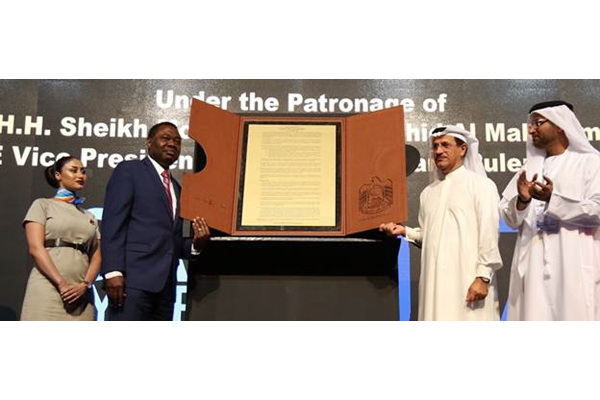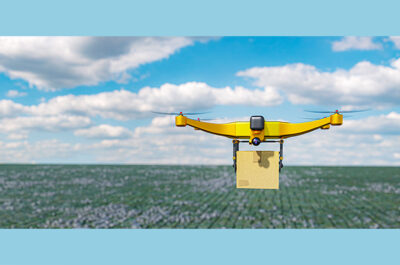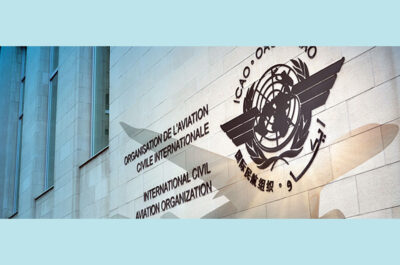
ICAO Secretary General Dr. Fang Liu spoke to the importance of South American air transport infrastructure and economic policy development last week while opening the 2017 IATA Wings of Change event in Rio de Janeiro.

ICAO Council President, Dr. Olumuyiwa Benard Aliu, receives a special gift from H.E. Sultan Bin Saeed Al Mansoori , Minister of Economy and Chairman of the Board - UAE General Civil Aviation Authority (GCAA). The gold plaque includes an engraving of the commemorative Dubai Declaration emerging from ICAO’s inaugural Cyber Summit and Exhibition, which runs from 4-6 April 2017 in Dubai.

The President of the ICAO Council, Dr. Olumuyiwa Benard Aliu, provided a keynote address to the Second ICAO Meeting on the Sustainable Development of Air Transport in Africa. He urged States to promptly address their air transport liberalization and infrastructure development priorities.
ICAO Summit formalizes new Dubai Declaration to ensure global aviation remains united, proactive on cybersecurity preparedness. Also, ICAO highlights infrastructure development and economic policy priorities at IATA Wings of Change event in Brazil.
MONTREAL and ACCRA – African States, industry stakeholders, and international and regional organizations gathered in Accra, Ghana, for the Second ICAO Meeting on the Sustainable Development of Air Transport in Africa.
Organized in conjunction with the Ghana Civil Aviation Authority (GCAA), the Meeting gathered 224 participant from 36 States and many international organizations. They assessed progress towards the implementation of the Antananarivo Declaration of 2015, and agreed on future actions to bolster its implementation.
The President of the ICAO Council, Dr. Olumuyiwa Benard Aliu, provided a keynote address to the event, urging African states to promptly address their air transport liberalization and infrastructure development priorities.
“The slow implementation of the Yamoussoukro Decision has resulted in lessened African air transport connectivity and competitiveness,” he noted, stressing further the related priorities under the African Union’s (AU’s) Agenda 2063 and toward the creation of a Single African Air Transport Market (SAATM).
Referring to the short-term need for aviation infrastructure deelopment in Africa, President Aliu called it a “formidable challenge,” noting that “the rapid growth of air traffic will place increased pressure on existing aviation capacity, and it is currently projected that no fewer than 24 airports in Africa will be saturated by 2020.”
He encouraged African States to take pragmatic measures to build a transparent, stable and predictable investment climate to support aviation development, and to integrate aviation development planning into their national development and multi-modal transport plans.
President Aliu reiterated in closing that ICAO will continue to play a leadership role in ensuring that aviation growth brings greater socio-economic benefit to Africa, its citizens, States, industries and economies at large.
“We have taken great strides in cooperating more successfully in a number of air transport domains,” he concluded, “and by continuing to work together, through ICAO, even greater growth and prosperity await the African continent in the years ahead.”
Special events during the ICAO Meeting focused on the promotion of air transport within the Economic Community of West African States (ECOWAS) sub-region, as well as air links between Africa and the Diaspora.
ICAO Summit formalizes new Dubai Declaration to ensure global aviation remains united, proactive on cybersecurity preparedness
Underscoring the inherent value in establishing a global cybersecurity framework for aviation, the President of the ICAO Council, Dr. Olumuyiwa Benard Aliu, welcomed a special commemorative Dubai Declaration which signifies the commitment and unity of the air transport sector towards achieving effective cyber resilience.
The new Dubai Declaration was presented to President Aliu during a special ceremony at the UN agency’s inaugural Cyber Summit and Exhibition in Dubai, which is running from 4-6 April and being conducted in close partnership with the General Civil Aviation Authority of the United Arab Emirates.
“New and more sophisticated digital technologies and processes are coming online daily it seems, impacting as they do our network and its relationships with shippers and the travelling public,” President Aliu stressed to the more than 500 experts from 90+ countries attending the ICAO Summit. “What this means for cybersecurity and cybersafety stakeholders is that threats are emerging at an ever-increasing rate.”
At ICAO’s 39th Assembly last October, world governments signalled their awareness and concern on cyber risks and threats through Resolution A39-19 on Addressing Cybersecurity in Civil Aviation. Concerning variations currently persist among States, air navigation service providers, aircraft and airport operators, and others in terms of the cyber mitigation measures being set out – highlighting the need for improved sector-wide collaboration.
“Some may suggest this points to a role for near-term ICAO provisions to be established,” President Aliu continued, “however we are still at too nascent a stage to determine appropriate and practical Standards in the Annexes to the Convention on International Civil Aviation.”
He also noted that civil aviation should continue to appreciate and reinforce the inherent mitigation capabilities of pilots and air traffic controllers, aviation’s traditional ‘first responders’, and highlighted that the sector’s increasing connectivity to external networks, and the use of public communication infrastructure for transmitting data and exchanging information, represent further risks which must be carefully managed.
“The basic interconnectedness we have all grown accustomed to in our day-to-day digital lives is now also a basic characteristic of on-board and ground-based aviation systems,” he remarked. “This makes them potentially vulnerable to outside cyber-attack, and explains why the logical or physical segregation of safety critical systems is a crucial first step for global aviation.”
The conclusions and commemorative Dubai Declaration emerging from the ICAO/UAE Summit will help to establish near-term prioritization of suitable back-up systems and procedures, cyber resilience steps, and security overlays, in addition to the more intensive collaboration needed and clarity on roles and responsibilities.
Much of this strategic planning and guidance will be enshrined in ICAO’s new Global Aviation Security Plan (GASeP), the development of which is being fast-tracked after calls for its accelerated development by world States. The GASeP is expected to be launched by the end of 2017, following a State consultation period.
ICAO highlights infrastructure development and economic policy priorities at IATA Wings of Change event in Brazil
ICAO Secretary General Dr. Fang Liu delivered a strong message on the importance of States’ commitments for infrastructure development to address looming capacity shortfalls and optimize air transport benefits, when she presented a keynote address this week at the 2017 IATA Wings of Change event in Rio de Janeiro, Brazil.
The airline operator gathering was taking place concurrently with the International Brazil Air Show, which Dr. Liu opened one day earlier, and brought together leaders of the air transport industry in ICAO’s South American (SAM) Region.
“Over the last few years, South America has witnessed enhanced air connectivity, expanded passenger and cargo markets, more competitive fare structures, increased destinations for travellers, and positive socio-economic contributions from the industry,” Dr. Liu highlighted. “If we ask ourselves how we might further optimize these benefits, and sustain this projected growth, improved compliance with ICAO’s global standards is the first and most obvious response, but this is followed very closely by the need for modernized air transport facilities and infrastructure.”
Dr. Liu stressed to the aviation leaders that while Brazil’s recent airport development example has been a positive one, many other facilities across the region were not prepared to handle the currently-projected traffic growth.
“The implication of not being more proactive on aviation development will be cascading downturns in national tourism and trade performance,” she stressed. “This situation is by no means exclusive to South America, but with global flight and passenger volumes projected to double, in just 15 years’ time, the longer States wait to invest, the more significant their negative socio-economic impacts will be.”
The ICAO Secretary General also highlighted the importance of air transport integration in South America. “ICAO has adopted a long-term vision to help facilitate and encourage liberalized air transport in States,” she stated, calling for harmonization of consumer protection regulation and competition laws and policies to strengthen regional air transport integration.
While on mission in Brazil, Dr. Liu held an extensive round of discussions with high-ranking Brazilian officials relating to ICAO’s global Standards and the importance of aviation development, infrastructure investment and global connectivity to the State’s sustainable socio-economic prosperity. She also participated in the inauguration of Brazil’s first-ever Women in Aviation chapter, addressed the Executive Committee of the Latin American Civil Aviation Commission (LACAC), visited a number of Brazil’s civil aviation installations, and provided remarks to the closing session of an ICAO Regional Seminar on current aviation environmental protection priorities.
The high-ranking government officials met during her visit included Brazil’s Chief of Staff of the Presidency of the Republic, Mr. Eliseu Padilha, its Minister of Foreign Relations, Mr. Aloysio Nunes, Minister of Transport, Ports and Civil Aviation, Mr. Mauricio Quintella, Minister of Tourism, Mr. Marx Beltrao, the President of Brazil’s National Civil Aviation Agency (ANAC), Mr. Jose Ricardo Botelho, and other officials from Brazil’s Airspace Control Department and Air Navigation Authority.
In her meeting with Brazil Chief of Staff of the Presidency Mr. Eliseu Padilha, Dr. Liu expressed ICAO’s satisfaction with the aviation sector strategies and enhancements which Brazil has lately undertaken, in particular its plan for the development of regional airports to connect remote areas and expand their tourism and economic development potential.
She encouraged Brazil to share its best practices in this area with neighbouring States, and thanked Brazil for its renewed commitments to support ICAO regional cooperation and capacity-building programmes in South America, as guided by its local Regional Office in Lima.
Other Ministerial discussions centred around the economic aspects of Brazil’s status as an aircraft manufacturing hub and its key contributions to green aviation biofuel development, the recent United Nations Security Council Resolution encouraging States to work with and through ICAO to better protect civil aviation against acts of terrorism, current ICAO Global Plan targets for aviation Safety and Air Navigation, including Performance-based Navigation (PBN), and the importance of Brazil’s participation in the newly-agreed Carbon Offsetting and Reduction Scheme for International Aviation (CORSIA). She was also grateful to receive updates on the many initiatives Brazil is pursuing to enhance international tourism more generally.
Other officials met with in Brazil included the United States FAA Deputy Administrator, Ms. Victoria Wassmer; the Administrator of ANAC Argentina, Eng. Juan Pedro Irigoin, and the President of Argentina’s Accident and Incident Investigation Board, Ms. Pamela Suarez; the President of LACAC and Director General of Civil Aviation of Colombia, Mr. Alfredo Bocanegra Varon, and the Director General of Civil Aeronautics of Guatemala, Mr. Carlos Velasquez Monge, to exchange views on issues of common interest.
Theodore is the Co-Founder and Managing Editor of TravelDailyNews Media Network; his responsibilities include business development and planning for TravelDailyNews long-term opportunities.



































































































































